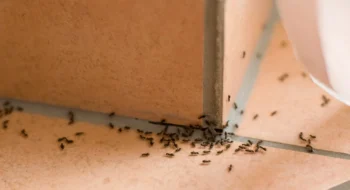 Ants are notorious invaders of kitchens and pantries, but sometimes, they venture into unexpected areas like closets or laundry baskets. It might seem baffling to find ants crawling on your freshly laundered clothes, especially when you’ve kept everything clean and tidy.
Ants are notorious invaders of kitchens and pantries, but sometimes, they venture into unexpected areas like closets or laundry baskets. It might seem baffling to find ants crawling on your freshly laundered clothes, especially when you’ve kept everything clean and tidy.
Why Are Ants Attracted to My Clean Clothes?
It might surprise you, but ants can be drawn to your clothes for several reasons. While ants aren’t interested in the fabric, certain external factors can make your clean clothes appealing to these tiny pests.
One of the most common reasons for finding ants on your clothes is the presence of sugary residues. Even though your clothes may look spotless, microscopic traces of food, sugary drinks, or sweat can still linger. Ants have an incredible sense of smell and are especially attracted to anything sweet. If you’ve spilled a sugary beverage, eaten while wearing certain clothes, or touched your clothes after handling food, this can be enough to attract ants. So, if you’ve ever wondered, “why are ants attracted to my clean clothes?” – the answer might be as simple as these invisible traces of sugar.
Believe it or not, ants can also be attracted to salt and oil in human sweat. Even after washing, some fabrics may retain trace amounts of these substances, leading ants to investigate your clothes in search of moisture or salt. While it’s not common, this can explain why ants might crawl over your clothing, not because they eat fabric, but because they’re interested in what’s left on it.
In some cases, your laundry products could be to blame. Certain scented detergents and fabric softeners contain sweet fragrances that can lure ants. The fresh, pleasant smell we enjoy from newly washed clothes can confuse ants into thinking there’s food nearby. If you notice ants in clothing right after doing laundry, your detergent or fabric softener might be the reason!
Do Ants Eat Clothes?
Fortunately, the answer is no. Ants do not consume fabric or cause the same damage as pests like moths. They may crawl on clothes but are generally not interested in eating them. Ants are primarily interested in finding food sources like sugars and proteins, which are not in fabric.
Ants and Diabetic Concerns
You may have heard about a link between ants and diabetes. People with high blood sugar may notice ants being attracted to their sweat as individuals with diabetes may sweat more or have higher glucose levels in their perspiration, which could, in turn, attract ants. If you notice ants on your clothes and suspect a health-related cause, such as high blood sugar, you must check with a healthcare professional to ensure your blood sugar levels are under control.
What Attracts Ants to Closets?
Finding ants in your closet can be concerning, but it’s not uncommon. While closets aren’t typical places for ants to establish colonies, they may explore any area that offers food or moisture.
If your closet is damp or humid, it can create an ideal environment for ants, especially during dry seasons when they seek water sources. Another potential attractant is dirty laundry. As previously mentioned, sweat, food residues, or spills on clothes can draw ants in. This could explain their presence if you store dirty laundry in your closet. Additionally, ants often venture beyond their primary food source, so if your closet is near a kitchen or pantry, they may simply wander through in search of new food opportunities.
How to Prevent Ants from Getting on Your Clothes
If you’re dealing with ants on your clothes or in your closet, there are several steps you can take to prevent this issue in the future:
- Wash clothes thoroughly to remove sweat, food residue, or other attractants. Use unscented detergents to avoid drawing ants in with sweet fragrances if possible.
- Consider storing clean clothes in airtight bins or bags.
- Clean your closet regularly.
- Check for entry points, as ants can enter homes through tiny cracks and crevices.
Call Us for Expert Ant Control Solutions for Your Closet and Home
While finding ants on your clean clothes might seem strange, there’s usually a simple explanation. Whether it’s sugary residue, sweat, or even laundry products with enticing scents, ants are drawn to more than just the fabric itself. The good news is that ants do not eat clothes, so they shouldn’t cause lasting damage to your wardrobe.
Keeping your clothes, closet, and laundry area clean can reduce the chances of finding ants in these unexpected places. If you’re still struggling with ants in your home or closet, it might be time to contact our professional ant exterminators for expert advice and assistance.
